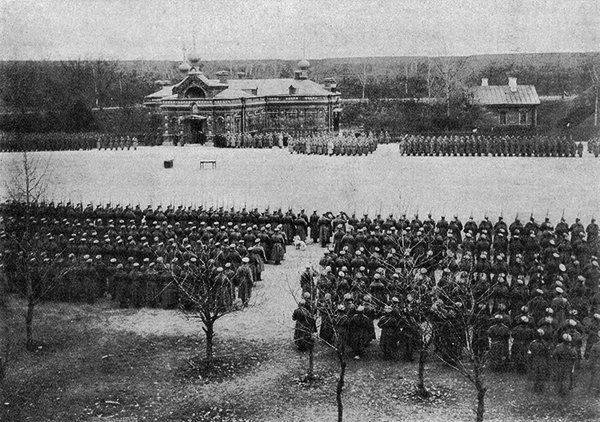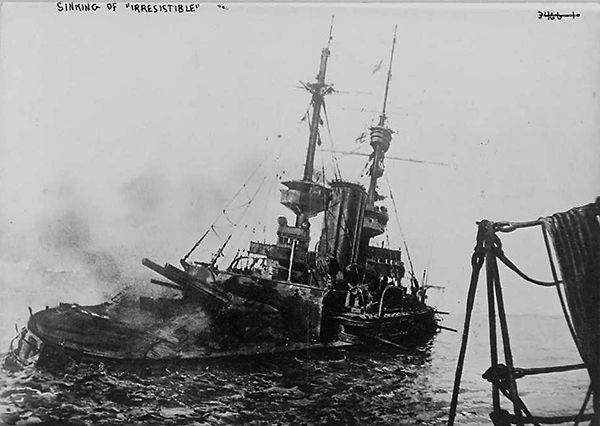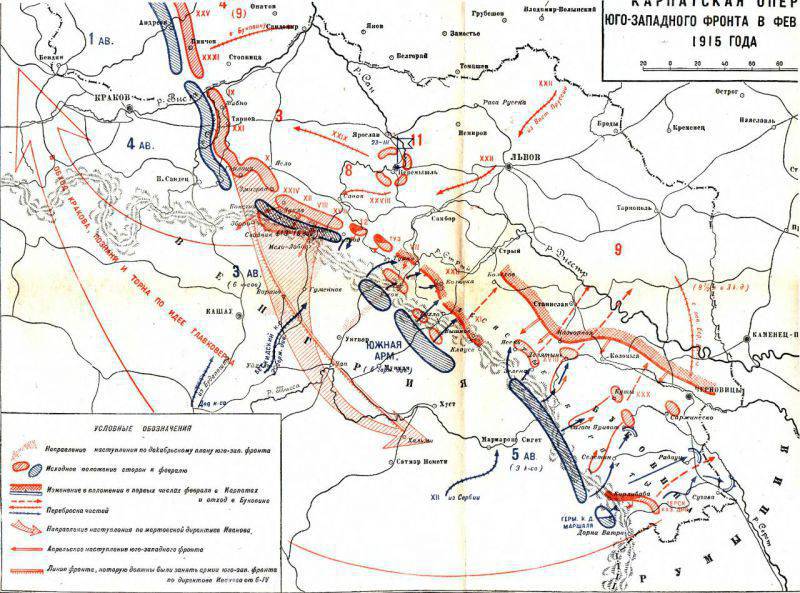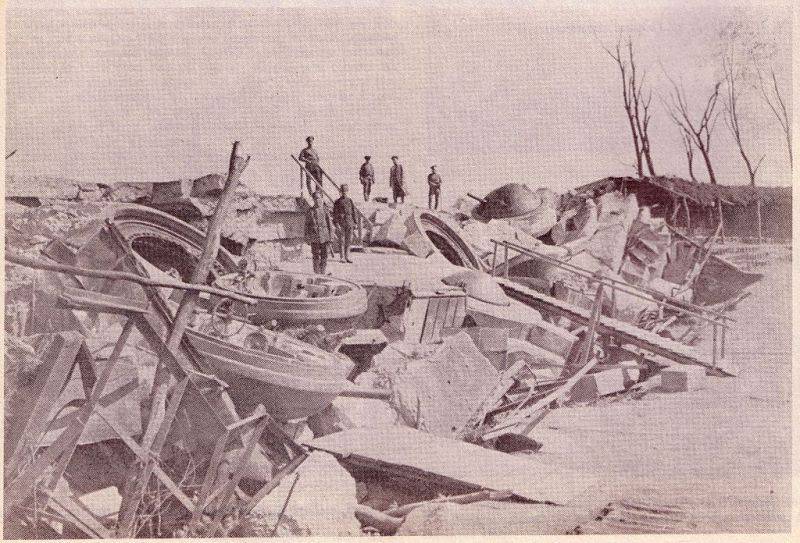Bosphorus bait for Russia
The commander of the German troops on the Eastern Front, Hindenburg, receiving a fresh 4 corps, decided to use them together with the Austro-Hungarian troops to deliver a crushing blow to Russia, which was supposed to end the war, withdrawing the Russian Empire from the war already in 1915. German troops were to defeat the Russians in Eastern Prussia, directing a strike at Lida - Grodno, and Austrian - at crushing the Russians in Galicia, directing a strike at Tarnopol - Lviv.
Thus, the German command hoped to reach all Russian armies from the Baltic Sea to the Carpathians, defeat the Russian troops, create a huge gap in the Russian front and end the campaign in the East with a separate peace with St. Petersburg. Success in the East should have led to victory in the West.
In the northeastern direction, the Germans planned to make double coverage of the 10 th (Neman) Russian army, which had an open right flank and poorly secured, due to non-concentration of the 12 th army, left flank. However, in order to preserve the effect of surprise, Hindenburg sacrificed the concentration of all forces assigned to the operation and began the operation until the completion of the transfer of all reinforcements. The Germans formed two shock fists: 1) a new 10 army between Tilsit and Insterburg, directing it to the rear of the Russian 10 army to Vladislav - Calvary and further on; 2) The 1½ corps with cavalry were supposed to concentrate south of Lake Shpirding and advance on the Raygorod-Augustow, where it was supposed to close the encirclement with the 10 army. Both strike groups were on the flanks and were supposed to forge the enemy by combat.
However, the February August operation (Death of the 20 Russian Corps) or the Mazury battle ended for the Germans as a strategic failure, although the battle was won by the German army. The plans of the Russian command to invade East Prussia were destroyed. 10-I Russian army was defeated, suffered heavy losses. In strategic terms, the plan of the German command of the Eastern Front, which was part of the plan to create the "strategic Cannes" of the Austro-German High Command, failed. German troops could not carry out a deep coverage of the right wing of the Russian front and, in cooperation with the Carpathian grouping, carry out a common strategic environment for the Russian armies. They could only, at the cost of serious losses, expenditure of the 4 forces of the fresh corps and the loss of the surprise factor, push the main forces of the 10 of the Russian army to the Neman and across the Beaver River. At the same time 10-I Russian was not defeated and retained combat capability. German troops were able to surround and destroy only one army corps - the 20 corps. The Russian command retaliated and stabilized the front.

Russian soldiers in Osovets
Already 17 February (2 March) The 1-I, 12-I and 10-I Russian armies launched a general offensive in order to push the German troops from the Bobr and Narev lines to East Prussia. The Russian command responded to the blow of the enemy with a counterstrike. The Prasnysh operation began (Battle for Prasnysh). The whole of March was fought in hard battles in the area between the line of the Middle Neman, Beaver and Narev and the East Prussian border. Russian troops pushed the enemy, but did not achieve any serious success. Hindenburg, because of the need to transfer German troops to the Carpathian Front to support the Austrian army and replenish German forces on the Western Front, was forced to go on the defensive on the entire border of East Prussia.
The Prasnysh operation completed the winter fighting on the right wing of the strategic Russian-German front. Their overall result was the disruption of the strategic plan of the German command to reach Russian forces from the north. However, the plan of the Russian command for the deep invasion and defeat of the German forces in East Prussia was destroyed, which in the future allowed returning to the plan of an offensive in the Berlin direction. Russian troops suffered sensitive losses by people and the material part. They were driven out of East Prussia for the third time. The idea of consolidating the right flank of the Russian front by seizing East Prussia and advancing to the Lower Vistula was completely thwarted. East Prussia became a strategic springboard for the German army, with which the Germans can make a deep summer coverage of the year 1915. In addition, the winter battles on the borders of Prussia delayed and weakened the offensive of the Russian army in the Carpathians. Part of the forces that were intended on the South-Western Front, redeployed to the North-Western Front.
In this case, the operations of the Russian army on the Eastern Front favorably affected the position of the French and the British on the Western Front. The attention and forces of the supreme German command were diverted from the West, which created the conditions for the accumulation of human and military material resources.
Large-scale Carpathian operation ("Rubber War" in the Carpathians), which lasted from January to April 1915, also did not reveal the superiority of one of the parties. The Russian offensive with the aim of breaking through into the Hungarian plain and withdrawing Austria-Hungary from the war, on which the command of the South-Western Front had pinned great hopes, was overdue. The Austro-German command managed to transfer large forces to the southern strategic direction, preparing their offensive in order to cover the 8 of the Russian army, breaking through to the Russian rear and the de-blockade of the Przemysl fortress. At the second stage of the operation, the advancing Austro-German troops were to become the southern claw, which, together with the armies that had struck from East Prussia, created a huge “Polish cauldron”.
Therefore, the Russian offensive resulted in a fierce and bloody oncoming battle among the snow-capped mountains. At the same time, at the first stage, the enemy had an advantage in numbers. However, the Russian command deciphered the enemy’s plan and responded with a regrouping of forces, which thwarted the plan of the Austro-German command. Austro-German troops could not defeat Brusilov's 8 army and unlock Przemysl.
In general, the battle ended in favor of the Russian army. But Russian plans to withdraw from the war the Austro-Hungarian Empire collapsed. The Russian army suffered huge losses - about 1 million people killed, wounded and captured. This number also included casualties during the siege of Przemysl, as well as a huge number of frostbitten and sick. The losses of the Austro-Hungarian troops were slightly lower - about 800 thousand people. The Russian army spent in the Carpathian battle and in operations on the border of East Prussia all the main reserves. As a result, the Russian command refused any offensive actions for a considerable time.
March 22 The Russian army won the last major victory in the 1915 campaign of the year. After the 6 month blockade, Przemysl fell. 3 the day before the Austro-Hungarian garrison surrendered, a decisive sortie was undertaken, the troops were stocked for several days to reach their own. The attack was repelled by the blockade troops of the Russian 11 Army, several thousand Austrians were captured. 9 generals, 2500 officers, 120 thousand soldiers surrendered to Russian troops. Russian trophies were 900 guns (according to other data 1 050).
Brusilov on the ruins of the forts of Przemysl
Diplomacy. The straits
18 March 1915, the United Kingdom and France agreed to resolve the Eastern Question by transferring Constantinople to the Black Sea straits of the Russian Empire. Earlier, England and France invariably impeded the implementation of Russian claims to Constantinople and the Bosphorus and Dardanelles. However, when the Ottoman Empire became the enemy of the Entente, Paris and London could no longer oppose the fair demands of St. Petersburg. Moreover, the British and French needed Russia's help in the fight against the Central Powers and wanted to interest the tsarist government in waging the war to a victorious end. It was a kind of bait for St. Petersburg, so that the Russians did not make a separate peace with the Germans.
In addition, the British wanted to divert Russia from South Persia and access to the Persian Gulf. Obviously, a part of the English elite had an understanding of the fact that the Russian Empire would not survive a world war, so Russia can promise anything. All the same, to give Constantinople and the straits of the Russian Empire will not be necessary. The fact that after the war, England (and France) were not going to give Russia Constantinople and the Bosphorus with the Dardanelles is confirmed by the Dardanelles operation that began in February 1915. Russia's Western allies tried to seize the straits themselves. However, the Turkish troops showed unexpectedness for the British and French combat capability and repelled the blow.
The British began to make promising allusions to acquisitions in Turkey in the 1914 year. 1 September 1914 was announced by the British Foreign Ministry that it "no longer considers it necessary to spare High Port" and that Turkey "can no longer be a guardian of the straits." On September 2, the British embassy in Petrograd, in a memorandum sent to the Russian foreign minister, said: "According to his Majesty's government, Turkey does not deserve to be considered as it has proved itself incorrigible and unbearable." On September 9, the Russian ambassador in London sent E. Gray to the Petrograd already quite clear statement that “if Germany is crushed, the fate of the straits and Constantinople cannot be solved this time otherwise than in accordance with our benefits.”
True, not everyone in England wanted to make concessions to Russia. Thus, Churchill proposed only “expressing sympathy” to Russian wishes and for the time being restrict himself to this. Others were afraid that the excessive strengthening of Russia in the Mediterranean would repel Italy and the Balkan countries from the Entente. So, Bulgaria almost obviously took the side of the German Empire, and Greece, for all the proposals of the Entente, which offered her all sorts of benefits, began to remain silent. However, in the end, the British Cabinet came to the conclusion that the demand for Russia to get the straits should be met. Britain planned to reward itself at the expense of other parts of the Ottoman Empire. Premier Asquith: "We and France in return should receive a significant part of the whole frame of the Turkish Empire."
France did not so willingly meet the wishes of Petrograd. The French big bourgeoisie had a strong financial and economic position in Turkey and regarded the loss of Constantinople as a major loss. Not daring to openly condemn the initiative of London, French diplomacy tried to prove that solving the issue of Constantinople and the straits “according to Russia's desire” does not necessarily mean annexation, trying to find other forms. But in Paris, they also realized the priority of binding Russia to the Entente and their political interests won out. As a result, France supported the position of Britain.
In further negotiations with the tsarist government, Anglo-French diplomacy focused its attention on receiving appropriate compensation from the Russian Empire and on securing the condition that St. Petersburg could receive Constantinople and the Straits only at the cost of participation in the war against Germany to the bitter end.
The memorandum of the Russian Foreign Minister Sazonov addressed to the British and French ambassadors in Petrograd Buchanan and Paleolog from 4 in March 1915 outlined the boundaries of the interests of the Russian Empire: the city of Constantinople, the western coast of the Bosporus, the Sea of Marmara and Dardanelles, South Thrace to the Enos-Medes line, as well as the islands of the Sea of Marmara, the islands of Imbros and Tenedos, and a part of the Asian coast between the Bosphorus, r. Sakarya and the point to be determined on the shores of the Gulf of Izmit.
The memorandum of Sazonov from 22 in March of 1915 of the year contained the consent of Petrograd to provide Britain with a number of compensations. So calling the “neutral zone” in Persia (as Iran was called then), envisaged by the Anglo-Russian agreement 1907 of the year, when the north of the country departed to the interests of the Russian empire, and the south in Britain, and the center remained “no one’s” British Empire. Other compensations provided by Russia to England concerned the freedom of transit of goods through Constantinople and the freedom of merchant shipping in the straits. In addition, Petrograd took London’s view of the future of the Ottoman Empire: the preservation of “independent Muslim rule” in Mecca and Medina (actually under British control), and the separation of the Caliphate from Turkey. Russia pledged to exert all possible influence on Romania and Bulgaria, so that they sided with the Entente. In addition, Britain received a zone of influence in Greece and Asia Minor, and France established Cilicia, Syria and Palestine.
Thus, London and Paris beat Petrograd. The British and French courageously promised Constantinople and the straits, but in reality they were not going to give them away. Constantinople became a lure for the Russian government and the public. At the same time, for the broad strata of the population, peasants and workers who bore the brunt of the war, the Bosphorus meant nothing. The goals of the war were incomprehensible to the people. Russia had to wage war to a victorious end, which excluded the possibility of reaching an agreement with Germany and at the last moment to save the empire, which was rapidly leading (including external forces) to the abyss.
Russia did not need to link the receipt of Constantinople and the straits with the war to the bitter end. Russia could get them rightfully strong, and not from the lordly shoulder of London and Paris.

Royal battleship fleet Irresistible plunges after a mine explosion in the battle of the Dardanelles
Speech of Italy
In the spring of 1915, Italy entered the war (Italian "jackal" enters the war). She has been bargaining with both sides since August 1914. The Germans rated the strike power of Italy very low, considering that its neutrality was more useful for Germany. However, the Italians became impudent and even for neutrality demanded a great deal that Austria-Hungary gave them Trentino and part of Tyrol. The Entente could offer more, so Rome leaned toward France and England.
Russia doubted the great importance of Italy as a military ally. But Britain and France insisted, since Italy could divert from them some of the forces of the Central Powers. In addition, Russia was not attracted to Italy, since Petrograd saw a rival Belgrade in Rome. Rome claimed a large sphere of influence in the Balkans, hitting the interests of Serbia, the traditional ally of Russia. The Treaty of Union of Italy with Britain, France and Russia was signed in London on 26. April 1915. 23. May Italy declared war on Austria-Hungary.
To be continued ...


Information